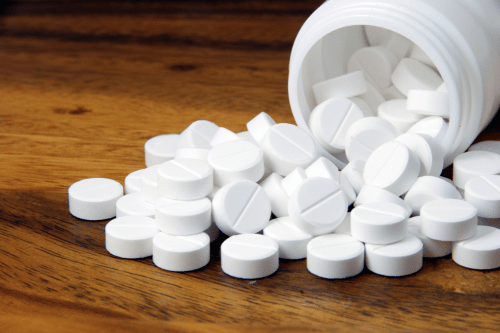

The K 18 pill is a widely known tablet that contains oxycodone hydrochloride, an opioid pain medication used to treat moderate to severe pain. As a Schedule II controlled substance, it is regulated due to its high potential for misuse, abuse, and addiction.
Recognizing a history of drug abuse is crucial when discussing the risks associated with oxycodone, as individuals with such a history need to carefully consider the potential for dependence and addiction. Understanding what the K 18 pill is, its intended uses, and the potential dangers it presents is essential, especially for those struggling with pain management or at risk for opioid addiction.
In this comprehensive guide, we will explore what the K 18 pill is, how it works, its common side effects, and the risks of misuse. Furthermore, we will discuss the dangers of addiction and dependency associated with this opioid, offer advice on how to use it safely, and highlight the available addiction treatment options.
The K 18 pill is a small, yellow, round tablet imprinted with the code “K 18.” It is a generic form of oxycodone hydrochloride, a potent opioid analgesic. Oxycodone is typically prescribed for patients experiencing severe pain that cannot be managed with over-the-counter pain relievers or less potent medications.
The side effects and risks associated with k18 pills include respiratory depression and the potential for addiction, making it crucial for both patients and healthcare providers to monitor and manage their use carefully.
The active ingredient, oxycodone hydrochloride, belongs to a class of drugs known as opioid analgesics, which work by altering the way the brain and nervous system respond to pain. This type of medication is often used for patients dealing with chronic pain or recovering from surgery, but it comes with serious risks of dependency, abuse, and adverse side effects.

Oxycodone, the active component of the K 18 pill, is a narcotic analgesic designed to block pain signals in the body. It interacts with mu opioid receptors in the brain and spinal cord, effectively reducing the perception of pain by stopping pain signals before they reach the brain.
However, this same mechanism of action that makes oxycodone effective in treating severe pain also contributes to its addictive properties. The drug can produce feelings of euphoria in addition to pain relief, which makes it particularly prone to misuse. Misuse of prescription medications like oxycodone can lead to severe side effects, including respiratory depression, especially in individuals with a history of addiction or physical dependence.
The K 18 pill is primarily prescribed to treat moderate to severe pain, especially in patients who require long-term, around-the-clock pain management. This medication is particularly beneficial for those suffering from chronic pain conditions like arthritis, cancer, or serious injuries.
While the K 18 pill is effective in pain management, it is usually reserved for situations where other non-opioid analgesics or pain relievers have proven ineffective. Its strong pain-relieving properties come with the caveat that it must be used with caution and under strict medical supervision. Pain medications, including opioids, are effective in managing moderate to severe pain but carry risks such as addiction, respiratory depression, and increased sensitivity to pain over time.
Like many opioid medications, the K 18 pill comes with a wide range of side effects. While not every patient will experience all of these symptoms, it is important to be aware of the potential side effects associated with oxycodone:
One of the most serious side effects of the K 18 pill is respiratory depression, a condition in which respiratory depression occurs, causing breathing to become slow and shallow. This can lead to life-threatening complications, especially when the drug is taken in higher doses than prescribed or combined with other substances like alcohol or central nervous system depressants.
Oxycodone and other opioids are notorious for causing constipation, which can become severe if not managed properly. Patients should discuss preventive measures with their healthcare provider, such as taking stool softeners or increasing fiber intake.
Patients taking the K 18 pill often experience extreme drowsiness or sedation, which can impair their ability to drive or operate heavy machinery. In some cases, the sedation can be so profound that patients are at risk for accidents or falls.
Low blood pressure, or severe hypotension, is another common side effect of opioid medications like oxycodone. This can result in dizziness, fainting, and other cardiovascular complications.
Many patients experience nausea or vomiting when they start taking the K 18 pill. This side effect may subside over time as the body adjusts to the medication, but persistent symptoms should be discussed with a healthcare provider.

While the K 18 pill is effective for managing pain, it also carries significant risks, especially if misused. Misuse can take many forms, including taking more than the prescribed dosage, using the medication without a prescription, or combining it with other substances like alcohol or illicit drugs. Addressing drug addiction through comprehensive addiction treatment options is crucial for those struggling with prescription drug addiction and other substance use disorders.
Oxycodone, the active ingredient in the K 18 pill, is a highly addictive substance. Opioid addiction can develop quickly, especially in patients who take the medication for extended periods or in higher doses than prescribed. Once addiction takes hold, it can be extremely difficult to break free without professional intervention.
Even when used as prescribed, patients can develop a physical dependence on the K 18 pill. Physical dependence means that the body becomes accustomed to the presence of the drug, and stopping the medication abruptly can lead to withdrawal symptoms such as anxiety, muscle aches, nausea, and irritability.
One of the most significant risks associated with the K18 pill is the potential for opioid overdose. Taking too much oxycodone can lead to respiratory depression, extreme drowsiness, and unconsciousness. In severe cases, overdose can result in death if not treated immediately.
Certain individuals are at higher risk of experiencing negative side effects or addiction when taking the K 18 pill. The following groups should avoid or take extra precautions when using this medication:
Patients with a history of respiratory depression, asthma, or other breathing disorders may experience worsening symptoms while taking oxycodone. The K 18 pill can make it more difficult to breathe, especially if the patient already has underlying respiratory issues.
Those with a history of drug abuse or mental health conditions such as depression or anxiety may be more likely to misuse opioids like oxycodone. These patients should consult their healthcare provider to explore alternative pain management options.
Combining oxycodone with other central nervous system depressants, such as alcohol or benzodiazepines, can significantly increase the risk of respiratory depression and overdose. Patients should avoid mixing medications unless explicitly instructed by their healthcare provider.
Using the K 18 pill safely and effectively requires careful adherence to your healthcare provider’s instructions. Patients should never increase their dose or take the medication more frequently than prescribed. Additionally, it’s essential to understand the risks of combining oxycodone with other medications or substances.
Before starting the K 18 pill, patients should have a thorough consultation with their healthcare provider to discuss potential risks, alternative treatment options, and preventive measures for side effects like constipation or respiratory depression.
To minimize the risk of misuse or accidental ingestion by others, patients should store the K 18 pill in a secure location and dispose of any unused medication through a drug take-back program.

If a patient suspects that they or someone else may have overdosed on the K 18 pill, it’s critical to seek immediate medical attention. Symptoms of an opioid overdose include:
Severe respiratory depression
Extreme drowsiness
Confusion or delirium
Blue lips or nails
Unresponsiveness or loss of consciousness
The use of naloxone (Narcan) can reverse the effects of an opioid overdose in many cases. Patients at risk for overdose should discuss obtaining naloxone with their healthcare provider.
For those who have developed a dependence on the K 18 pill, stopping the medication can result in painful withdrawal symptoms. It is crucial to taper off the medication gradually under the supervision of a healthcare provider to avoid severe withdrawal reactions.
Common withdrawal symptoms include:
Muscle aches
Restlessness or anxiety
Sweating
Nausea and vomiting
Insomnia
Patients struggling with opioid addiction or dependence on the K 18 pill should seek help from a professional addiction treatment center. Sullivan Recovery offers a range of evidence-based treatment programs to help individuals overcome addiction and regain control of their lives.
At Sullivan Recovery, patients can access a variety of treatment modalities, including medication-assisted treatment (MAT), counseling, and support groups. These comprehensive services are designed to help individuals manage withdrawal symptoms, prevent relapse, and build a healthy, substance-free future.
Depending on the severity of the addiction, patients may benefit from either inpatient or outpatient addiction treatment programs. Inpatient programs offer 24/7 care and support in a structured environment, while outpatient programs provide more flexibility for patients to continue their daily lives while receiving treatment.
For patients concerned about the risks associated with opioid medications, there are several non-opioid analgesics and alternative pain management options available. These include:
Physical therapy
Non-opioid medications
Cognitive-behavioral therapy
Acupuncture
Patients should discuss alternative treatments with their healthcare provider to find the best approach for managing their pain while minimizing the risks of opioid dependency.
The K 18 pill is a potent oxycodone hydrochloride tablet prescribed for the management of severe pain. While it offers effective pain relief, the risks of opioid addiction, physical dependence, and respiratory depression make it a medication that must be used with caution. Patients should always follow their healthcare provider’s instructions and remain vigilant for signs of misuse or addiction.
For those struggling with opioid drugs dependency or addiction to the K 18 pill, Sullivan Recovery provides the support and resources necessary to achieve long-term recovery. By offering comprehensive addiction treatment options, they help individuals reclaim their lives from the grip of opioid addiction and move toward a healthier future.

At Sullivan Recovery, as an in-network provider we work with most insurance plans, such as:
And More
If you or a loved one are struggling with mental health challenges or substance abuse, reach out to Sullivan Recovery today. Our team of compassionate professionals is here to support your journey towards lasting well-being. Give us a call at 949-836-7180.
The K 18 pill is a generic form of oxycodone hydrochloride, commonly used to treat moderate to severe pain. It is often prescribed to patients who need long-term pain management for conditions like chronic pain or after surgery.
Yes, the K 18 pill can be addictive. Oxycodone is a powerful opioid with a high potential for addiction and physical dependence. Misuse of this medication, taking it without a prescription, or exceeding the prescribed dose can lead to opioid addiction.
Common side effects of the K 18 pill include constipation, drowsiness, nausea, vomiting, and low blood pressure. More serious side effects include respiratory depression and the risk of opioid overdose, especially if combined with alcohol or other sedatives.
If you have been taking the K 18 pill for a long time, discontinuing it abruptly can lead to withdrawal symptoms such as anxiety, nausea, and muscle aches. It is important to taper off the medication gradually under the guidance of a healthcare provider to avoid severe withdrawal symptoms.